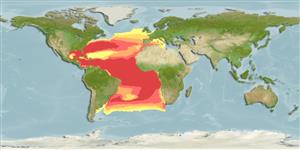Common names from other countries
Issue
This species is synonym of Istiophorus platypterus in Eschmeyer (CofF ver. Jan. 2018) according to Collette et al., 2006 (Ref. 84358). Several authors consider it as a valid species.
Environment: milieu / climate zone / depth range / distribution range
Sinh thái học
Biển; Ở đại duơng, biển (Ref. 51243); Mức độ sâu 0 - 200 m (Ref. 43). Subtropical; 21°C - 28°C (Ref. 43); 56°N - 55°S, 99°W - 18°E (Ref. 43)
Atlantic Ocean: in tropical and temperate waters approximately 40°N in the northwest Atlantic, 50°N in the northeast Atlantic, 40°S in the southwest Atlantic, and 32°S in the southeast Atlantic. Migrating to Mediterranean Sea, mostly based on juvenile specimens. Highly migratory species.
Length at first maturity / Bộ gần gũi / Khối lượng (Trọng lượng) / Age
Maturity: Lm 133.5, range 121 - 146 cm
Max length : 315 cm TL con đực/không giới tính; (Ref. 43); common length : 240 cm TL con đực/không giới tính; (Ref. 5217); Khối lượng cực đại được công bố: 58.1 kg (Ref. 43); Tuổi cực đại được báo cáo: 4 các năm (Ref. 72497)
Các tia vây lưng cứng (tổng cộng) : 0; Các vây lưng mềm (tổng cộng) : 48 - 53; Tia cứng vây hậu môn: 0; Tia mềm vây hậu môn: 9 - 12; Động vật có xương sống: 24.
Usually found in the upper layers of warm water above the thermocline, but also capable of descending to rather deep water. Often migrate into near-shore waters. Occasionally form schools or smaller groups of 3 to 30 individuals, but often occur in loose aggregations over a wide area. Feed mainly on small pelagic fishes but also takes bottom-dwelling organisms. Females grow larger (Ref. 4770). Utilized fresh, canned and frozen; eaten steamed (Ref. 9987).
Around Florida in USA, this species often moves inshore into shallow waters where females, swimming sluggishly with their dorsal fins extended and accompanied each by one or more males, may spawn near the surface in the warm season. However, spawning in offshore waters beyond the 100 fathom isobath was also reported from south of Cuba to Carolina, USA. Off southeast Florida, a 33.4 kg female may shed up to 4.8 million eggs in three batches during one spawning season.
Nakamura, I., 1985. FAO species catalogue. Vol. 5. Billfishes of the world. An annotated and illustrated catalogue of marlins, sailfishes, spearfishes and swordfishes known to date. FAO Fish. Synop. 125(5):65p. Rome: FAO. (Ref. 43)
IUCN Red List Status (Ref. 130435)
CITES (Ref. 128078)
Not Evaluated
Threat to humans
Harmless
Human uses
Các nghề cá: Tính thương mại; cá để chơi: đúng
Các công cụ
Special reports
Download XML
Các nguồn internet
Estimates based on models
Preferred temperature (Ref.
115969): 16.3 - 27.4, mean 23.5 (based on 431 cells).
Phylogenetic diversity index (Ref.
82804): PD
50 = 0.7505 [Uniqueness, from 0.5 = low to 2.0 = high].
Bayesian length-weight: a=0.00447 (0.00193 - 0.01034), b=3.14 (2.94 - 3.34), in cm Total Length, based on LWR estimates for this (Sub)family-body shape (Ref.
93245).
Mức dinh dưỡng (Ref.
69278): 4.5 ±0.4 se; based on diet studies.
Thích nghi nhanh (Ref.
120179): Trung bình, thời gian nhân đôi của chủng quần tối thiểu là 1.4 - 4.4 năm (K=0.29-1.2 (?); tm=3.5).
Prior r = 0.19, 95% CL = 0.13 - 0.29, Based on 3 full stock assessments.
Fishing Vulnerability (Ref.
59153): High vulnerability (60 of 100).
Climate Vulnerability (Ref.
125649): Moderate vulnerability (42 of 100).
